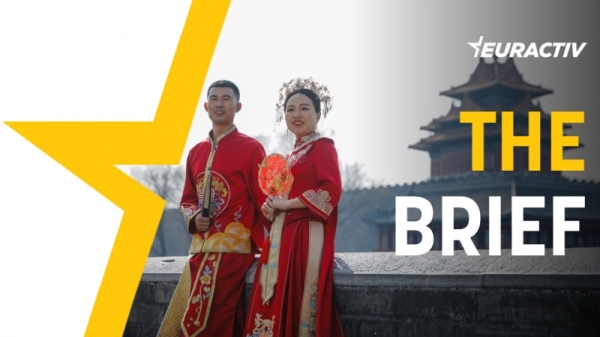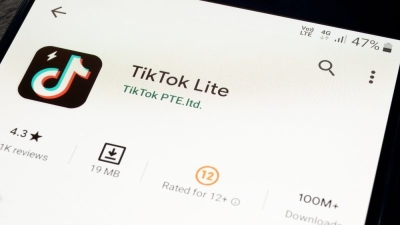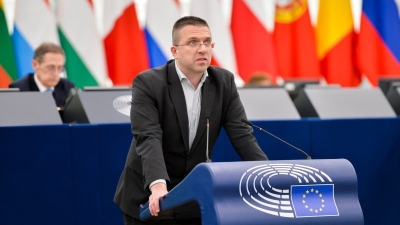The Brief — China’s strategic ambiguity

On the anniversary of Russia’s full-scale invasion of Ukraine, China published a 12-point peace plan for the conflict, with a flurry of bilateral visits anticipated. But can China help end the war in Ukraine? What should we realistically expect?
For the past year, China’s position has been ambiguous. Beijing has refrained from explicitly endorsing Russia’s rationale for its aggression and has shunned terms such as “invasion’ and “attack” in public speech and state-controlled media – to the extent that it doesn’t use the term “peace” either.
By avoiding the term “war” and replacing it with “Ukraine crisis”, China can afford to also avoid using the term “peace”. What the press dubs China’s ‘peace plan’ is officially called ‘Position on the Political Settlement of the Ukraine Crisis’.
Ukraine doesn’t like the term ‘Ukraine crisis’, underlining that the conflict is not a home-grown problem but one of Russian aggression.
However, it should be remembered that China did not recognise the Russian annexation of Crimea in 2014, nor the September 2022 annexations of the regions of Donetsk, Luhansk, Zaporizhzhia and Kherson.
Bejing has officially stated that “the sovereignty and territorial integrity of all countries, including Ukraine, must be respected”.
At the same time, China has abstained in key UN votes condemning the annexation of Ukrainian territory by Russia, most recently in a vote on the first anniversary of the aggression, demanding the Russian forces’ withdrawal.
It is important to remember that China has also consistently warned against the use and threat of use (by Russia) of nuclear weapons, which Ukraine does not have.
China reacts negatively to the banalisation of the nuclear discourse and sees a risk of nuclear proliferation resulting from the war in Ukraine, which would adversely affect its region.
While Beijing has been enjoying cheap Russian gas and oil, it has not – at least openly – provided military assistance to Russia. Helping an aggressor state would be an explosive move in the eyes of the West, and China has not crossed this line – yet.
Moscow applauded the peace plan and unsurprisingly, Washington has been forthright in rejecting it – but perhaps no other US reaction was really possible after the Chinese balloon incident.
An initial reaction by Volodymyr Zelenskyy – who said he hadn’t read the proposal – was positive, and he even said he would like to meet his counterpart Xi Jinping. However, shortly after, the Beijing initiative was critiqued by one of Zelenskyy’s advisors.
Reactions from the EU and NATO were sceptical.
French President Emmanuel Macron was the most forthcoming, announcing that he would visit Beijing in April. And the Chinese ambassador to the EU said European Council President Charles Michel and Commission chief Ursula von der Leyen will also visit Beijing in the first half of the year.
One thing is certain: Diplomatic overtures facilitated by China could take place only if Beijing doesn’t start sending military aid to Russia – a red line highlighted by Washington.
CIA chief William Burns said that the US intelligence agency is “confident that the Chinese leadership is considering the provision of lethal equipment”. Reportedly, this could include suicide attack drones, including the capacity to build Chinese drones in Russia.
But Burns added that the US had no evidence that a final decision has been made yet or that lethal equipment has actually been shipped.
If Ukraine and Russia are to end up at the negotiating table, China could indeed be a precious partner, especially if it succeeds in retaining the confidence of Kyiv.
With or without Vladimir Putin, framing any form of peace as “agreeing on Chinese proposals” would likely be much more palatable to the Kremlin than “caving in” to the demands of the West.
What these proposals say is another issue, and the final version would certainly be a text quite different from the 12 points. But in such a text, Bejing’s interest would be to secure a phrase about “abandoning Cold War mentality”, which is more precious to an economic giant such as China than to post-war Russia.
Compared to other geopolitical players, China has the advantage of thinking long-term, many years ahead. To achieve its historic goals China can be patient until it becomes the number one power worldwide in all categories, including the economy, innovation, or military spending.
In China’s long-term forethought, a war such as Russia’s aggression against Ukraine is a ‘black swan’ representing an unwanted risk.
It is also in the EU’s interest if China could succeed, sometime soon, in bringing together interlocutors who would never sit at the same table in other circumstances.
‘Ambiguity’ has a negative connotation, but China’s ‘strategic ambiguity’ in the case of the war in Ukraine gives them a valuable advantage.
The Roundup
French energy transition minister Agnès Pannier-Runacher will meet on Tuesday (28 February) with twelve counterparts in Stockholm to discuss the potential launch of a brand new “nuclear alliance” within the EU.
While Spanish farmers have embraced integrated pest management (IPM), as per EU rules on the matter, they say more support and research is needed to extend the application of the biological control.
Paris wants the EU’s electricity market reform completed by the end of the year, the French energy minister’s office said on Friday (24 February), challenging Berlin’s preference to wait until the 2024 European elections.
Two years in, the post-Brexit points-based immigration system is negatively affecting labour and skills shortages, with low-skilled EU-born workers hit hardest. Wage bargaining in impacted sectors remains at a standstill.
Since the onset of the war in Ukraine, the EU has been increasingly wary of dependency on China, especially regarding critical raw materials. According to MEP Hildegard Bentele, the EU should prepare for the eventuality of a Chinese attack on Taiwan and potential subsequent sanctions and supply shortages.
Look out for…
- Commission President Ursula von der Leyen meets with President of Federation of German Industries (BDI) Siegfried Russwurm, and President of the Mouvement des Entreprises de France (MEDEF) Geoffroy Roux de Bézieux, via videoconference.
- Vice-President Dubravka Suica delivers opening remarks for pre-Summit for Democracy event: ” Democracy Global Coalition Forum “, organized by International IDEA.
- Health and Food Safety Commissioner Stella Kyriakides delivers the opening remarks at an Event on European Health Data Space at the European Parliament.
- Informal meeting of telecommunications, transport, energy ministers, continues on Tuesday.



